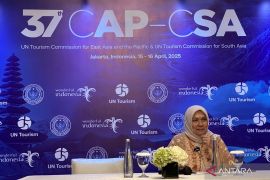Jakarta,Feb 29 (ANTARA) - The National Child Protection Commission (KPAI) has estimated that 50 per cent of Indonesian children have no birth certificates due to reasons such as unregistered marriages.
Having no birth certificate has became a major problem in Indonesia, since a birth certificate is required for children to be enrolled in schools.
When the children turn 7, a birth certificate will be required to apply for an ID card or "KTP". And when they became adults, they will need a birth certificate to apply for jobs and get a marriage license.
In short, a birth certificate for Indonesian children is critical because it is used as a legal confirmation of their existence.
However, here in Indonesia, for many years, it has been the norm that children born out of wedlock would only have a legal relationship with their mother and not with their father.
They are declared as illegitimate on their birth certificates under Indonesia's 974 Marriage Law.
The 974 Indonesian Marriage Law regarded children of "nikah siri", or an unregistered marriage, as being born out of wedlock, which is the same as children resulting from adultery.
As such, those children will not only lose their basic rights to have a chance for a brighter future, but they also will not have any legal claims against their biological fathers, because the identity of the father is not noted on the birth certificate.
Milestone change
Fortunately, that kind of situation will not last forever. On Friday, Feb 7, the Constitutional Court (MK) issued an important ruling which became a milestone in Indonesian legal history.
This landmark ruling stipulated that the civil rights of children born out of wedlock must be recognized by their biological fathers.
This ruling is applied provided that relationships could be proven using science and technology, as well as witness testimony or other evidence recognized by the legal system.
The MK's ruling was in response to a judicial review filed by a dangdut singer, Aisyah Mochtar (popularly known as Machica Mochtar), who was married to the late Moerdiono, a former Secretary of State.
Machica filed the review toobtain the civil rights of her 6-year-old son, Muhammad Iqbal Ramadhan bin Moerdiono, Machica's son with Moerdiono. They married in a religious ceremony but she failed to register the marriage in the Civil Registration Agency.
Machica Mochtar challenged Article 2 Paragraph (2) and Article 43 paragraph () of the Marriage Law in the Constitutional Court.
She requested those two articles be removed, as she felt she was at a disadvantage, particularly regarding the right to obtain the legal status of her son, Muhammad Iqbal Ramadan.
The MK partially granted the petition filed by Machica Mochtar. The ruling stated that children born out of wedlock have a civil relationship with their father and family.
It is stated in Article 43 paragraph () of Law No. of 974 on Marriage:'Children who are born out of wedlock have only a civil relationship with her mother and her family', which runs is contrary to the 945 Constitution.
"So the paragraph should read: Children born out of wedlock have a civil relationship with her mother and her family as well as men as a father which can be proven by science and technology and/or witness testimony or other evidence recognized by the legal system to have blood relations, including civil relations with his family," said Chairman of the Indonesian Constitutional Court, Mahfud MD, reading the verdict in the Plenary Session of the Constitutional Court building, Friday (7/2).
Pros and cons
In every change there are always pros and cons. A cleric from Cilacap, KH. Maslahudin, stated that the new ruling should be reconsidered.
"I do not so agree, it should be reconsidered. This is *a *very important decision because factors associated with genes is observed by the Quran and the Prophet," said Maslahudin, in Cilacap, on Sunday, Feb 27.
Further, he said the new ruling can be misunderstood as an effort to encourage youth to have free sex before marriage.
"In Islam, if a man marries a woman who already carries a baby and the baby is born before the specified time, then the baby is not considered to be included in that man's line," he said.
In this case, he added, a child can be referred to as the male offspring if born within a span of at least six months after marriage.
"Thus, the recording of marriage over date, time, and hour is important because it is calculated up to six months or 80 days. If the child is born less than 80 days after marriage, men cannot be said to be the father, although he is really the biological father of the baby," noted Maslahudin.
Therefore, women who are born into such a condition, he said, cannot be within the custody of their biological father on their marriage ceremony.
With a different opinion than the clergy, the younger generation has approved of the new ruling.
"I agree with that new ruling, to me, sex must come together with
responsibility," said Dian (24).
Moreover, Dian said this new ruling is not an excuse for free sex or adultery.
"Tell me, if there is no such new ruling, can it be guaranteed that there will be no free sex or people who commit adultery?" Dian asked.
Meanwhile, Pras, 24, has another opinion; that this new ruling can be used to protect women's and children's rights.
"This is an effort to protect womens and children's rights, this is not about encouraging adultery," he said.
Follow-up
Mahfud MD called on the ministers of religious affairs and Interior affairs to immediately follow the decision of the Court, relating to the judicial decision on Act No. of 974 relating to marriage.
"I called on the two ministers to immediately regulate the administration of technical issues so that the Act can be implemented," he said at the inauguration of the Nahdlatul Ulama (NU), one of the largest Muslim organizations, at its new office building here on Monday.
According to Mahfud, the matter of citizenship and residence, should be handled by the Interior Minister, while civil rights should be organized by the minister of religious affairs. Article 43 paragraph () of Law No. of 974 on Marriage, states," Children born out of wedlock have only a civil relationship with their mothers and family"; and the law has no binding legal force and was meant to eliminate all civil relationships with their fathers, who can be proven by science and technology and/or other evidence under the law who have ties of blood.
Mahfud added, if some people fear this ruling could be a justification for adultery, then they should not worry. "In essence, this decision is aimed to prevent someone from committing adultery, because anyone who commits adultery cannot escape the responsibility because it will be pursued under the constitution and the new citizenship law," he added.
Mahfud explained that anyone who violates the new Marriage Law can be sued under religious-related prosecution.
(T.I027/INE)










